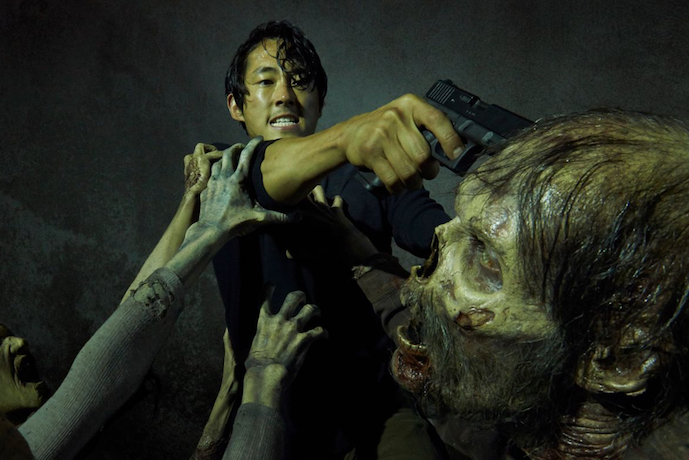The living dead have conquered America.
Television’s most popular scripted show is AMC’s The Walking Dead. Max Brooks’ wildly popular novel, World War Z, got turned into a movie. The oddly endearing Zombieland is (over)due for a sequel. Add in earlier iterations like 28 Days Later, 28 Weeks Later, Shaun of the Dead, Zombiecons that attract thousands, and it’s undeniable.
But what about zombies so consumes us? Any pop culture phenomenon so popular has of course elicited its share of explanations.
Maybe zombie hordes bring to mind anxieties about the world outside; the kind Syrian refugees elicit. Maybe it’s the vaguely religious resonances: The dead will rise again. But this is essentially a secular end-times theology—apocalypse without the awkward metaphysics. Or maybe zombies reveal our fears of an interconnected planet, what with viruses jumping from continent to continent before we can respond. The fear that the very sources of our success contain in them the seeds of our demise.
Or maybe it’s schadenfreude. The people most likely to survive the undead uprising are people the world had otherwise passed by. A revenge of the jocks on a planet of the nerds. Probably all of this is true to some degree. But something else is at work, too: racism. Or the lack of it. I think the reason so many of us love zombies is because we can. Zombies are the perfect villains for our multiethnic, multireligious, multicultural, interconnected age.
Zombies are bad, period. It’s not cultural, racial or ideological. It’s biological. We can cheer when they’re killed, maimed, or dismembered. We never have to feel bad about wishing them harm, nor have to uncomfortably skirt the token minority we invited to our viewing night or debate party when it turns out her ethnic group are the bad guys, and our ethnic group the good guys. Imagine if your prospective romantic partner speaks the foreign language the bad guy threatens America in. Netflix minus the chill.
Unless it’s a zombie movie.
These days we (rightly) care a lot more about respecting gender, color, and creed than maybe we ever have before. Some of this is moral. Some is just financial; we’re more careful about how we portray peoples, cultures and places because we’re aware of how much profit the wider world can bring in. That logic holds on the silver screen where films are increasingly made with international audiences in mind. (Lots of American films now make it a point to feature the world beyond the United States, from the Bourne films to Pacific Rim to Spy.)
That’s the case on the smaller screen, too. After all, America’s not just more diverse—we’ve always been diverse—America is now more respectful of its diversity. In modern American workplaces, you shouldn’t, for example, walk over to the water cooler and be like, “Hey, Kumar, did you catch that new episode of Homeland?”
Not only because Homeland is one of the more racist and clueless shows on television, but because Kumar might report you to HR for calling him a terrorist. Which, of course, wasn’t your intention, but now you’ve been fired and your name comes up in Google searches for terrorism, so good luck flying anywhere. You bigot.
But you can totally walk over and be like, “Hey, Kumar, did you see last night’s episode of The Walking Dead?” And you’ll still have your job. Hence the hugely popular reception zombies receive: They’re just easy for everyone to agree on.
Zombies are safely scary.
We like to see protagonists who reflect us. We don’t want to see antagonists who can be identified with us. There’s only so much Ivan Drago can do, only so many Arabs or Iranians who can be nemeses. But not just because they might be watching, or choose not to watch. We recently learned, for example, that we can’t even mock North Korea, because someone might turn around and hack the whole studio.
Zombies can’t leak embarrassing emails, or even write emails. They can’t protest, picket, or make you feel guilty for wanting to watch, like actual people can. They can’t boycott advertisers (though they may be able to eat them). They don’t even hate us. They can’t get enough of us.
The feeling, as it turns out, is mutual.





